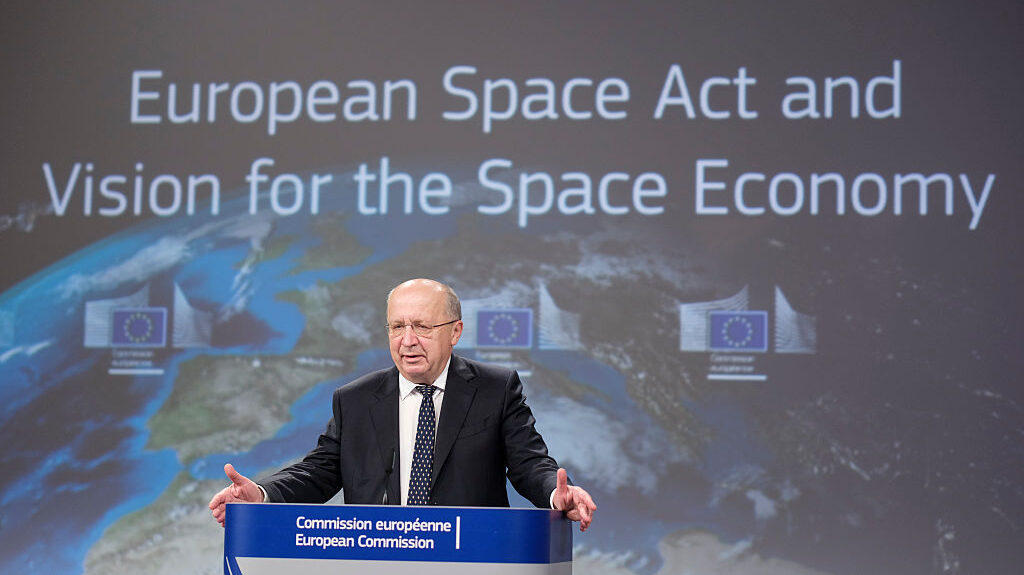Technology
US Condemns EU Space Law Draft for Threatening NATO Ties

The United States has vocally criticized a draft space law proposed by the European Union, arguing that it could hinder cooperation with NATO and impose unfair barriers on American companies. In a document submitted to the EU on March 24, 2025, the US State Department expressed serious concerns regarding the potential impact of the EU Space Act, highlighting provisions that could create “unacceptable regulatory burdens” on American space service providers.
The draft EU Space Act, introduced in June 2025, includes three main objectives: enhancing safety through robust rules for tracking space objects, improving resilience with tailored cybersecurity measures, and promoting sustainability by requiring operators to assess the environmental impact of their activities. The European Commission argues that these measures aim to unify the regional space market and protect EU systems from cybersecurity threats.
According to the European Commission, the Act intends to reduce bureaucracy and create a fair marketplace for businesses. “The EU Space Act is designed to cut red tape, protect space assets, and establish a predictable environment for enterprises,” the Commission stated in a June 24 press release. Nevertheless, the US perceives the law as part of a broader strategy to enhance European strategic autonomy, particularly in light of shifting US policies under previous administrations.
The State Department’s analysis categorizes the provisions of the draft law as “non-tariff barriers,” warning that if enacted, the law could complicate US cooperation with the EU and its member states on critical issues such as space weather, remote sensing, and space exploration. Specific concerns include environmental regulations for commercial satellites that exceed those set by US authorities and a clause that restricts approval of non-EU launch providers unless no suitable alternatives exist within the Union.
This draft legislation, according to US officials, undermines the objectives of the August 21, 2023, “United States-EU Framework on an Agreement on Reciprocal, Fair and Balanced Trade,” which aims to enhance market access and reduce trade barriers. The State Department also noted that individual EU member states might oppose the draft law, particularly as it pertains to their rights to engage in space partnerships with countries outside the EU.
The draft EU Space Act is expected to apply to various civil governmental activities, including those conducted by the European Space Agency (ESA) and the European Organisation for the Exploitation of Meteorological Satellites (EUMETSAT). The US government relies on data from EUMETSAT for critical weather predictions that inform military operations abroad. The State Department emphasized that the draft law could inadvertently affect these essential US activities, which is a significant concern.
Furthermore, while the draft includes provisions allowing member states to exempt national security activities, US officials argue that these exemptions are insufficient to ensure robust military collaboration between the US and NATO allies. The State Department’s document states, “The Act threatens US and EU development of commercial space capabilities,” raising doubts about the interoperability of systems and collaborative use of space assets for national security.
The response from the US was coordinated with various federal agencies and stakeholders from the space industry. Following the release of the draft law, the US Departments of State and Commerce sought feedback from government agencies and commercial entities regarding its implications. This consultation involved input from trade associations and over 70 companies with interests in the EU market.
Among the contentious provisions, the State Department pointed to regulations seemingly targeting US companies due to their size and market dominance, particularly concerning large telecommunications constellations. “Such unfair and unwarranted regulations are unacceptable to the United States and must be removed,” the document asserts.
The draft EU Space Act is currently under debate in the EU Parliament. Should it receive approval, it will then be presented to the European Council of Ministers for a final vote. The outcome of this legislative process could significantly impact transatlantic relations in the evolving landscape of space exploration and technology.
-

 Technology4 months ago
Technology4 months agoDiscover the Top 10 Calorie Counting Apps of 2025
-

 Health2 months ago
Health2 months agoBella Hadid Shares Health Update After Treatment for Lyme Disease
-

 Health3 months ago
Health3 months agoErin Bates Shares Recovery Update Following Sepsis Complications
-

 Technology4 weeks ago
Technology4 weeks agoDiscover 2025’s Top GPUs for Exceptional 4K Gaming Performance
-

 Technology2 months ago
Technology2 months agoElectric Moto Influencer Surronster Arrested in Tijuana
-

 Technology4 months ago
Technology4 months agoDiscover How to Reverse Image Search Using ChatGPT Effortlessly
-

 Technology4 months ago
Technology4 months agoMeta Initiates $60B AI Data Center Expansion, Starting in Ohio
-

 Technology4 months ago
Technology4 months agoRecovering a Suspended TikTok Account: A Step-by-Step Guide
-

 Health4 months ago
Health4 months agoTested: Rab Firewall Mountain Jacket Survives Harsh Conditions
-

 Lifestyle4 months ago
Lifestyle4 months agoBelton Family Reunites After Daughter Survives Hill Country Floods
-

 Technology3 months ago
Technology3 months agoUncovering the Top Five Most Challenging Motorcycles to Ride
-

 Technology4 months ago
Technology4 months agoHarmonic Launches AI Chatbot App to Transform Mathematical Reasoning

















